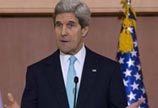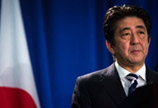Japan, South Korea divide is deepening
By Yu Kun-ha (China Daily) Updated: 2014-03-03 07:44When it comes to Japan, the United States and the Republic of Korea are in the same bed but with different dreams, as the Chinese saying would have it.
Their differences on Japan manifested themselves at a news conference jointly held by US Secretary of State John Kerry and his South Korean counterpart, Yun Byung-se, in Seoul in mid-February.
Kerry came to Seoul as part of an Asian tour that also took him to Beijing, Jakarta and Abu Dhabi.
|
 |
|
 |
His visit came one day after the two Koreas held their first high-level contact in seven years to discuss a family reunion event and a host of other pending issues.
It also coincided with the White House's announcement of US President Barack Obama's visit in April to four Asian nations - Japan, Republic of Korea, Malaysia and the Philippines.
During the new conference, Kerry and Yun spoke in one voice when they answered reporters' questions about the Democratic People's Republic of Korea (DPRK). Yet they spoke in different voices about Japan.
Kerry openly urged Seoul and Tokyo to mend their relations, which had plunged to their lowest ebb in years following Japanese Prime Minister Shinzo Abe's controversial visit to the Yasukuni Shrine in December.
The top US diplomat made no secret of Washington's willingness to mediate between the two neighbors, stressing the need for the three allies to maintain robust trilateral cooperation, particularly in the face of the DPRK's nuclear threat.
Noting that he has already started working on the task, Kerry said he and other US officials would "work very hard" over the course of the next few weeks and months to ensure that the two countries' frayed ties were repaired before Obama's visit.
Mindful of the "deeply felt historic differences" between Seoul and Tokyo, Kerry said he would encourage the allies to do two things simultaneously: Find mutually acceptable approaches to issues from the past and find ways to enhance bilateral and trilateral security cooperation.
Yet he urged the two countries to "put history behind them" and pay attention to the security issues that "are relevant in terms of today, not in terms of history" and involved high stakes "in terms of everybody's lives right now".
- NHTSA says finds no 'defect trend' in Tesla Model S sedans
- WTO rare earth ruling is unfair
- Amway says 2014 China sales may grow 8%
- President Xi in Europe: Forging deals, boosting business
- CNOOC releases 2013 sustainability report
- Local production by Chery Jaguar Land Rover this year
- Car lovers test their need for speed in BMW Mission 3
- China stocks close mixed Monday

















